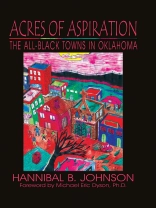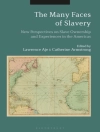Beulah Land. Paradise. Shangri-la. Oklahoma seemed to be all of these in the hostile, racist, post-Civil War South. Seeking both refuge and respect, pioneers such as Edward P. Mc Cabe championed the idea of Oklahoma as an all-Black state. And all-Black towns proliferated there. Some sixty all-Black towns, along with Tulsa’s Greenwood District, bear witness to the deep creativity and incredible human spirit of the people who built them.
About the author
Hannibal B. Johnson, a Harvard Law School graduate, is an author, attorney, and consultant specializing in diversity and inclusion issues, human relations, leadership, and non-profit leadership and management. He has taught at The University of Tulsa College of Law, Oklahoma State University, and The University of Oklahoma. Johnson serves on the federal 400 Years of African-American History Commission, a body charged with planning, developing, and implementing activities appropriate to the 400th anniversary of the arrival, in 1619, of Africans in the English colonies at Point Comfort, Virginia. He is the education chair for the 1921 Tulsa Race Massacre Commission. His books, including Black Wall Street, Up from the Ashes, Acres of Aspiration, Apartheid in Indian Country, and The Sawners of Chandler, chronicle the African American experience in Oklahoma and its indelible impact on American history. The 2011 National Black Theatre Festival showcased Johnson’s play, Big Mama Speaks-A Tulsa Race Riot Survivor’s Story. Big Mama Speaks has also been staged in Caux, Switzerland. Johnson has received numerous awards and honors for his work and community service.












